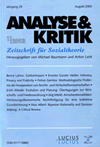Suchergebnisse
"Ignacio Santa Cruz"
Titel: Cooperation for Economic Success: The Mondragon Case
Autor: Ramon Flecha / Ignacio Santa Cruz
Seite: 157-170
Abstract: The Mondragon Corporation, a group of cooperatives, is a thriving example of how cooperatives can succeed. The authors describe six features of the corporation and five 'successful cooperative actions' that they consider to be crucial in explaining its accomplishments. Both the specific features and the successful actions are contrasted with those of standard capitalist companies, to show how this case is unique in the field of corporate organization and management. Through a combination of democratic principles, the values of solidarity, and strong competitiveness, Mondragon has simultaneously achieved both efficiency and equity and has become an alternative to the organizational and governance models of traditional capitalist firms.
Titel: Comment on Ramon Flecha and Ignacio Santa Cruz: The Priority of Labor and Capital Accounts
Autor: David Ellerman
Seite: 171-174
Abstract: Two aspects of the fine Flecha-Cruz paper can be usefully elaborated. The Mondragon cooperatives differ not only from capitalist firms but also from most other cooperatives in the doctrine of the 'priority of labor over capital' which means that the people working in any sort of cooperative will be members and will not be rented as employees. Also the Mondragon system of internal capital accounts solves the equity-structure problem that has plagued many modern cooperatives structured as non-profits or traditional worker cooperatives with 'membership shares'.

Work and Cooperation
2011 (33) Heft 1
Editorial
Both in social theories with the aim of looking into the creative core of society as well as in everyday politics, two intuitions often supplement each other. The first intuition, empirico-analytical, views common organization of work and production as being the very aim of society, and other parts of society being explicable from this. A second intuition, ethical or moral, holds the sphere of work to be the central site for diagnoses of a society's inherent justice. Both intuitions not only con...